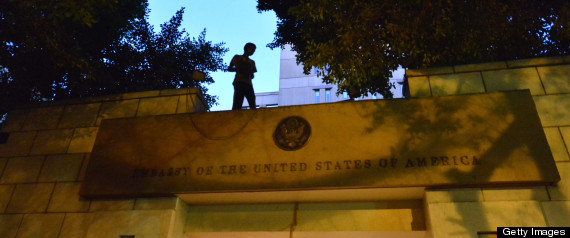
(AFP PHOTO / STR)
Tanta political prisoner Diaa al-Mahdi is the latest in a series of detained activists to go on hunger strike.
In a 23 August letter, al-Mahdi said he would join the activists in solidarity and begin a hunger strike until his release, said the Arabic Network for Human Rights Information (ANHRI).
Al-Mahdi was arrested from a Tanta cafe on 21 March, after which he was beaten, assaulted and tortured, said ANHRI. He is accused of joining a terrorist group and taking part in demonstrations and destroying public property.
A growing number of activists in prisons across Egypt have chosen to use hunger striking to protest their detentions.
High-profile activist Alaa Abdel Fattah began hunger-striking on 19 August, while several other notable activists, including Alexandria-based lawyer Mahienour El-Massry, Ahmed Douma, Mohamed Adel, Ahmed Maher, Hamada Al-Nubi and Wael Metwalli all began hunger strikes last week.
American citizen Mohamed Soltan, arrested last summer at the violent dispersal of the pro-Mohamed Morsi sit-in at Rabaa Al-Adaweya, has been on hunger strike for over 200 days. Soltan’s health is failing and he has been in and out of the hospital on numerous occasions.
Al-Jazeera journalist Abdallah Elshamy, arrested while covering the clearing of the sit-in at Rabaa Al-Adaweya, was released on 16 June after sustaining a hunger strike that lasted over 100 days. Elshamy suffered from “acute anaemia, the onset of kidney dysfunction, low blood pressure and hypoglycaemia, and his weight had dropped from 108 to 68kg”.
Abdel Fattah is currently being held at Tora Prison. On 11 June, he was sentenced, along with 24 others, to 15 years prison time by the Cairo Criminal Court for violating last year’s controversial Protest Law. The court also fined the defendants with EGP 100,000 each and ordered they be placed under police observation for five years after serving their time in prison.


